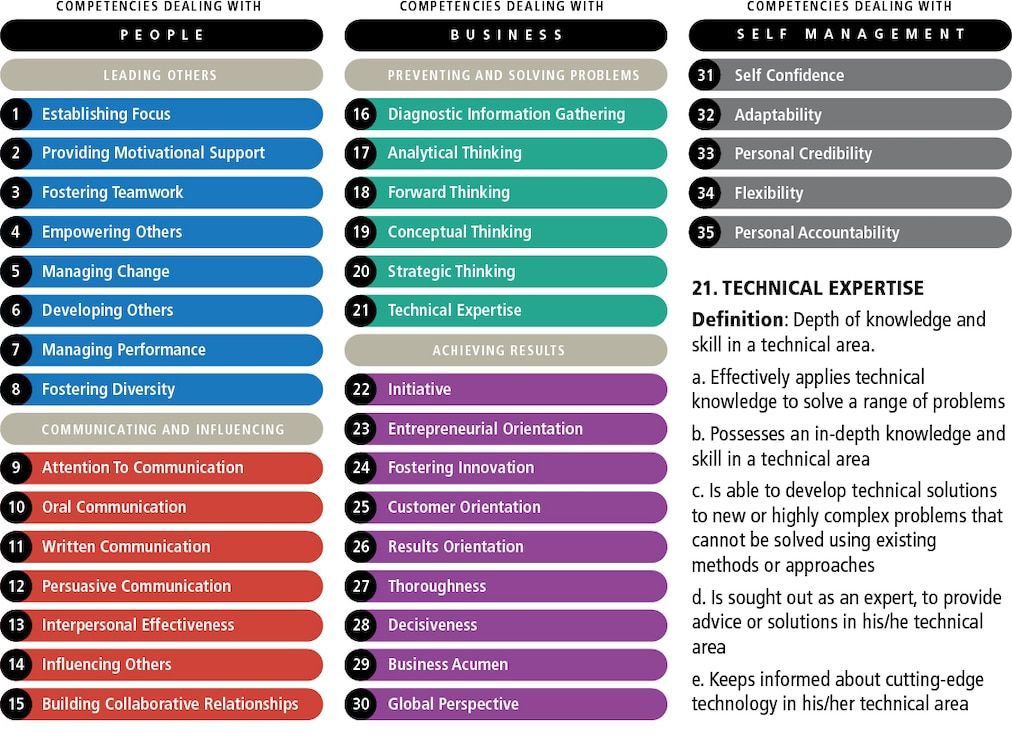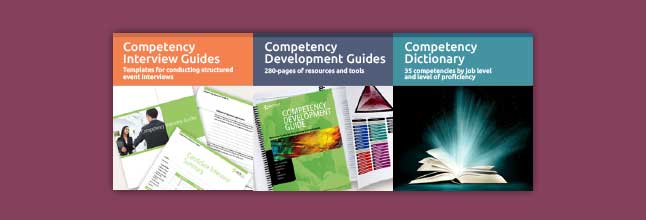Many organizations want to include technical competencies, skills, knowledge, in competency models and human resource applications. Off-the-shelf competency libraries and dictionaries for very specific technical specialties are available. Most are comprehensive, complex, and expensive.
In addition, the competencies are so job-specific that there may be no competency dictionaries or libraries that accurately describes all of the technical competencies used in an industry or organization. An alternative to using an off-the-shelf dictionary is to develop a custom dictionary, identifying the technical competencies using proven data collection and analysis techniques.
How to Determine Required Technical Competencies
A. Job Analysis Interviews
Job Analysis Interviews are usually conducted with capable job incumbents, but they can also be conducted with managers of job incumbents. The interview starts with a question about the four or five most important main responsibilities in the job. When these have been identified, the interviewer focuses on each main responsibility and asks about: (a) key tasks for this responsibility, (b) skills and knowledge required to perform the tasks for this main responsibility, and (c) performance criteria or measures used to assess performance in the job. The interviewee may also be asked to review a list of generic competencies and their definitions and select the 10 most important competencies for the job
B. Resource/Expert Panels
A Resource Panel is a three to six-hour facilitated meeting with an agenda that is to similar to, but broader than, the one covered in a Job Analysis Interview. The participants usually include 3-4 capable job incumbents, 3-4 managers of job incumbents, and 1-2 HR staff who work closely with job incumbents. A Resource Panel has three main purposes: (1) to gather data needed to identify the competencies for the job, (2) to build consensus among a set of key stakeholders about what the job requires, and (3) to build support for the project.
Typical Agenda for Resource Panel
A typical agenda for a Resource Panel includes the following components:
- Explain and sell the project
- Identify and reach consensus on four or five main responsibilities for the job
- For each responsibility, identify:
- Key tasks
- Performance measures or criteria
- Skills and personal characteristics needed
- Future scan
- Identify ongoing or anticipated changes in the organization, industry, and relevant technology that may affect the job
- Identify what each change implies, in terms of additional skills and personal characteristics that job incumbents will need
- Individually review a set of generic competencies and select a subset of these that are most important in the job.
- Review individual rankings of competencies and reach consensus on a set that panel members consider to be most important for the job.
Option: Virtual Resource PaneIs
This is web-based survey process for collecting information about job requirements and potential competencies. The survey contains both open-ended comment questions and quantitative ratings for collecting information about what a job requires. A set of 6-20 jobholders, managers of jobholders and other persons who are familiar with the job complete the survey. Workitect administers the survey, analyzes the responses, and prepares a detailed report that includes a draft competency model.
C. Other Methods
- Technical Job Requirements Interview
- Meeting with subject matter experts to identify and define technical skills for a department
- Mapping a department’s technical skills to its jobs
Instructions on how to conduct Job Analysis Interviews and Resource Panels are included in a Quick-Start Competency-Modeling Program (included with Workitect’s Competency Dictionary), Building Competency Models certification workshop, Creating Technical Competencies certification workshop, or onsite Guided Launch option.
Where to List Technical and Functional* Competencies
A. List the required technical knowledge and skills under the TECHNICAL EXPERTISE competency in Workitect’s Competency Dictionary.

TECHNICAL EXPERTISE is one of the 35 competencies in Workitect’s Competency Dictionary
Example: In an actual competency model for a Controller position in the retail company. Full Model (on page 5)
Technical Expertise: Having depth of knowledge in planning and allocation systems and thought processes.
– Demonstrates in-depth knowledge of having the right merchandise, in the right place, at the right price philosophy at the right time.
– Keeps informed and initiates system enhancements and new reports where necessary.
– Is sought out as an expert for analysis and problem solving relating to seasonal plans, assortment plans, MPC and store allocations.
B. List on a separate page in the competency model or job description
Example: Project Manager competency model in high-technology company. Full Model (on page 14)
TECHNICAL & FUNCTIONAL KNOWLEDGE REQUIREMENTS
Note: the following items were generated by a resource panel that met early in the project to analyze the Project Manager role and to provide information about job requirements. The panel was asked about specific technical and organizational knowledge requirements. The items below provide an outline of the main areas in which knowledge is required.
- Some technical understanding of the technical work being done
- Sponsor organization, its players, and their sensitivities
- ____structure, operations, and key players
- Knowledge of the sponsor organization’s key customers (e.g., airlines, military organizations)
- _____ procedures
- _____ Blueprint: what types of work _________ can and cannot do
- Domain knowledge of _________________
- Project management knowledge
- _________ organizational knowledge:
-
- Goals and strategies
- Internal politics and priorities
- Knowledge of how to get things done within _________
- Procedures
- Administrative system
C. List within a Complete Competency Model
Related Blog Posts
How to Include Technical Competencies in Competency Model
Developing Technical Competencies
Managing Role-Specific Technical Competencies
Obtain a License for Organization-Wide Use
Set of Three Integrated Tools for Selecting and Developing Talent
Low One-Time License Fee, No Annual Renewal Fees
For additional information, call 800-870-9490, email edward.cripe@workitect.com
or use the contact form at Workitect.
©️2025, Workitect, Inc.



